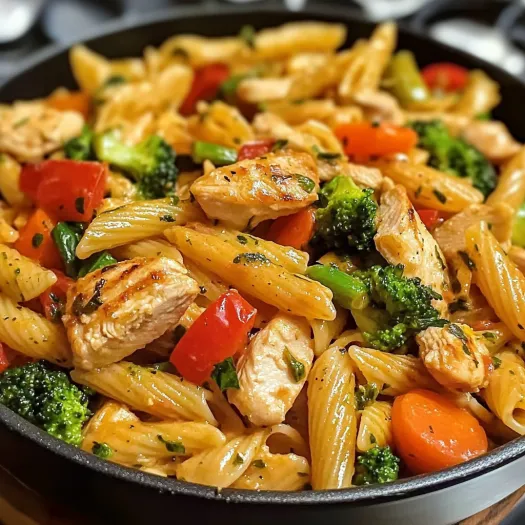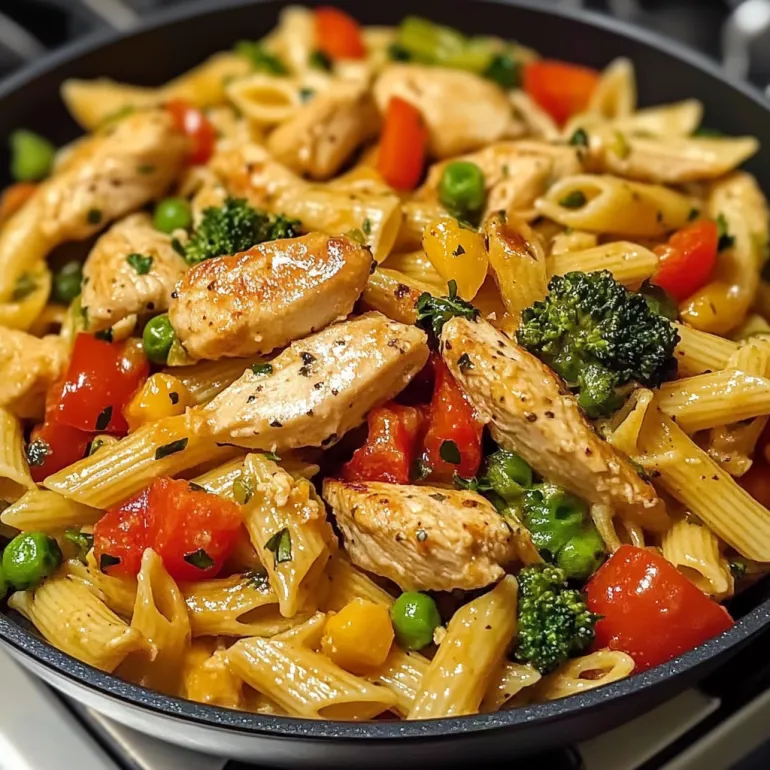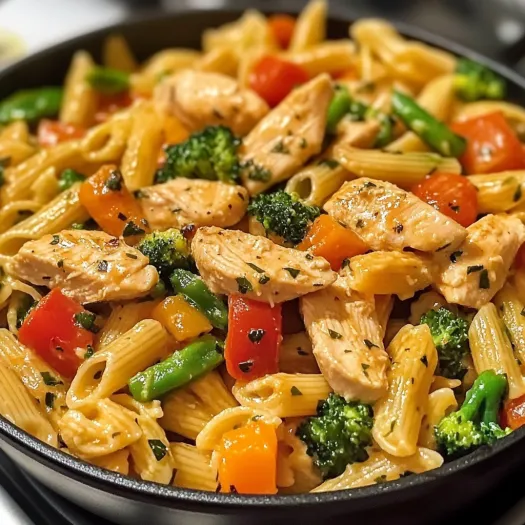 Pin
Pin
This colorful chicken pasta primavera has become my weeknight dinner hero, combining tender chicken, fresh vegetables, and pasta in a light, flavorful sauce that comes together in just 30 minutes.
I first made this pasta primavera when I needed to use up vegetables in my fridge before they spoiled. My family was so impressed they thought I had spent hours in the kitchen, and now it's on our regular rotation for those nights when we need something quick but satisfying.
Ingredients
- Boneless skinless chicken breasts: provides lean protein and becomes tender when cut into bite sized pieces
- Olive oil: creates the base for sautéing and adds richness to the final dish
- Garlic cloves: minced fresh adds aromatic flavor that's essential for depth
- Carrots: chopped adds sweetness and beautiful color contrast
- Frozen peas: convenient ingredient that requires no prep and adds bright flavor
- Green beans: adds texture and freshness look for crisp beans with vibrant color
- Chicken broth: creates a light sauce base without heaviness of cream
- Lemon juice: brightens all the flavors and balances the richness
- Cherry tomatoes: halved burst with sweet acidity when lightly cooked
- Shredded mozzarella: creates a light creamy texture without weighing down the dish
- Dry pasta: I prefer penne or farfalle as they catch the sauce beautifully
- Fresh parsley: chopped adds a pop of color and fresh herbaceous finish
- Grated parmesan: adds savory depth and satisfying umami finish
Step-by-Step Instructions
- Pasta Preparation:
- Cook your pasta according to package directions until al dente. Always salt your pasta water generously it should taste like sea water to properly season the pasta from within. Before draining reserve half a cup of that starchy water which will help your sauce cling to the pasta later.
- Prep and Cook Chicken:
- Cut chicken into uniform bite sized pieces so they cook evenly and season generously with salt and pepper. Heat olive oil in a large skillet until it shimmers then add chicken in a single layer. Cook for 3 to 4 minutes stirring occasionally until the pieces develop a light golden exterior. They dont need to be fully cooked through yet as theyll finish cooking later. Remove chicken to a plate to prevent overcooking.
- Start the Vegetable Base:
- Add carrots to the same pan with all those flavorful chicken bits and sauté for one full minute. The carrots need extra time since theyre the densest vegetable. Then add green beans and continue cooking for another minute. The vegetables should begin to soften but still maintain their bright color and some crispness.
- Complete the Vegetable Mixture:
- Add the frozen peas no need to thaw them first minced garlic and halved cherry tomatoes to the pan. Stir quickly to prevent the garlic from burning. Immediately add the chicken broth lemon juice and reserved pasta water to create a light sauce. The liquid will deglaze the pan incorporating all the flavorful browned bits from the bottom.
- Finish Cooking:
- Bring the mixture to a gentle boil then return the partially cooked chicken to the pan. Let everything simmer together for 3 to 4 minutes until the chicken is completely cooked through with no pink remaining and the vegetables are tender but still vibrant. The sauce will reduce slightly becoming more flavorful.
- Combine and Serve:
- Add the cooked pasta directly to the skillet along with the shredded mozzarella. Stir everything together over low heat until the cheese melts and creates a light creamy coating on the pasta and vegetables. Serve immediately with a generous sprinkle of fresh parsley and grated parmesan cheese for the perfect finishing touch.
 Pin
Pin
The lemon juice is my secret weapon in this recipe. I discovered its importance accidentally when I was out of white wine one evening. The acidity brightens all the flavors and cuts through the richness of the cheese, making the dish taste fresh and light rather than heavy.
Make It Your Own
This pasta primavera is incredibly versatile. During summer, I often swap in zucchini and yellow squash. In fall, butternut squash and kale make wonderful additions. You can even use leftover roasted vegetables from previous meals to make assembly even faster. The key is maintaining a balance of colors and textures.
Storage and Reheating
This chicken pasta primavera keeps beautifully in the refrigerator for up to 3 days in an airtight container. When reheating, add a splash of chicken broth or water to loosen the sauce as the pasta will absorb liquid as it sits. For best results, reheat gently on the stovetop rather than in the microwave to prevent the vegetables from becoming mushy.
Make It Ahead
If you want to prepare components in advance, cook the pasta and prepare the chicken and vegetable mixture separately. Store them in the refrigerator, then combine with fresh cheese when reheating. This method preserves the freshest flavors and textures while still giving you a head start on dinner.
Perfect Pairings
This bright pasta dish pairs beautifully with a simple arugula salad dressed with lemon and olive oil. For a complete meal, serve with garlic bread to soak up the light, flavorful sauce. A chilled glass of Pinot Grigio or Sauvignon Blanc complements the spring flavors perfectly if you're enjoying this for a weekend dinner.
 Pin
Pin
Frequently Asked Questions About the Recipe
- → What vegetables work best in pasta primavera?
While this dish uses carrots, green beans, peas, and cherry tomatoes, pasta primavera is versatile. Try asparagus, broccoli, bell peppers, zucchini, or yellow squash. The key is cutting vegetables to similar sizes for even cooking and using a mix of colors for visual appeal.
- → Can I make this dish ahead of time?
Yes! Prepare the chicken pasta primavera completely, cool, and refrigerate for up to 3 days. When reheating, add a splash of chicken broth or water to refresh the sauce. The vegetables may soften slightly but the flavor improves as ingredients meld together.
- → What pasta shapes work best with this dish?
Medium shapes that catch sauce and mix well with the vegetables work best. Try penne, fusilli, farfalle (bow-tie), rotini, or gemelli. Smaller vegetables may pair better with smaller pasta like orecchiette or shells.
- → How can I make this dish creamier?
For a creamier version, add 1/4 cup heavy cream or cream cheese when mixing in the pasta and cheese. You could also use ricotta or mascarpone for richness. Just reduce the pasta water slightly to avoid making the sauce too thin.
- → What proteins can I substitute for chicken?
Shrimp works beautifully and cooks even faster than chicken. Italian sausage adds wonderful flavor, or try cubed firm tofu for a vegetarian option. For a quick shortcut, use rotisserie chicken added at the end just to warm through.
- → How do I prevent the vegetables from overcooking?
Add vegetables in stages based on cooking time - harder vegetables like carrots first, then green beans, followed by quick-cooking vegetables like peas and tomatoes. This staged approach ensures each vegetable maintains its ideal texture and vibrant color.
